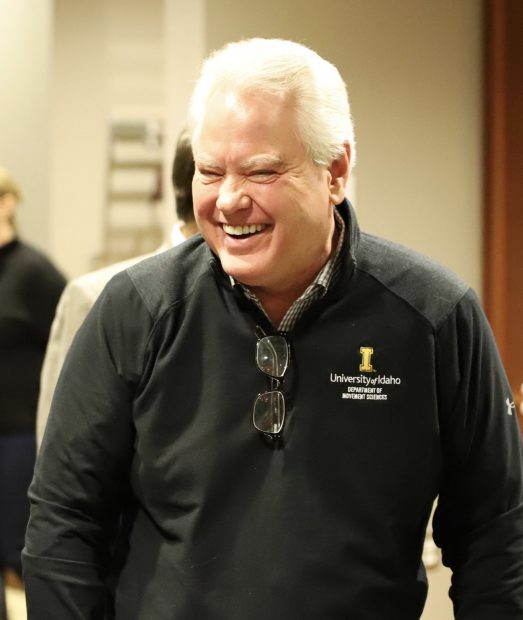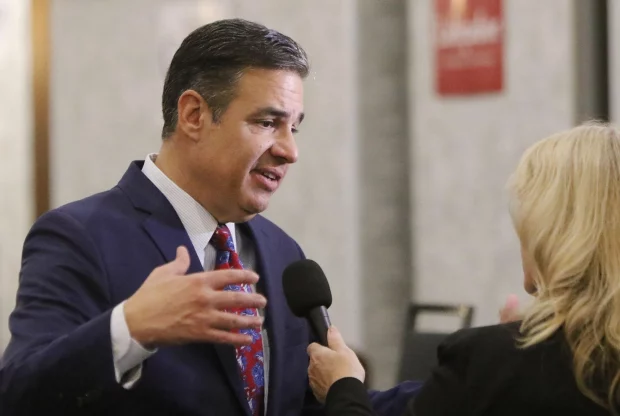During a surreal and contentious four days in an Ada County courtroom, lawyers questioned some of the state’s most powerful education leaders about transparency in government.
About open meetings — which are oxygen for reporters, and an obligation for elected and appointed officials.
And that’s what unfolded last week, as Attorney General Raúl Labrador’s team squared off with the State Board of Education’s hired lawyers. A discussion about letting the public in on the public’s business — in this case, the University of Idaho’s $685 million plan to buy the University of Phoenix — is inherently a good and important thing.
Good and important, as far as that goes. The civil trial before District Judge Jason Scott was restricted to an open meetings question: Did the State Board break Idaho law when it went behind closed doors to talk about the proposed Phoenix purchase? The trial left no time for the big picture question — why does the U of I and the State Board want to do business with Phoenix, a for-profit online school with huge enrollment of 85,000 and a half century track record of trouble? The U of I and the State Board have never bothered with a public discussion, doing most of its talking in those legal or illegal closed meetings.
Reasonably enough, Scott tried to keep the lawyers on task last week, and focused on the open meetings dispute. On at least two occasions, Scott cut off deputy attorney general Gregory Woodard as he attempted to bring up Phoenix’s $191 million Federal Trade Commission fine — and the false advertising complaints that went with it. Scott also made it clear that he wasn’t going to let State Board attorney Trudy Hanson Fouser introduce evidence about Phoenix’s profits.
In other words, the lawyers had little chance to paint Phoenix as a millstone or a moneymaker.
The rationale for the Phoenix purchase came up, but only in boilerplate terms Idahoans have heard before.
State Board President Linda Clark and board member Bill Gilbert talked about the board’s longstanding goal of breaking down geographic barriers, and pushing education programs into the state’s most remote corners.

U of I President C. Scott Green explained why traditional and for-profit schools make a good match. A declining birth rate means fewer 18- to 22-year-olds will be heading to college, creating a demographic ”cliff” that will put some schools out of business. The for-profits are seeking an “exit strategy,” and a way to get out from under some government regulations.
“The Department of Education truly has been tough on that market,” he said.
This marriage of convenience gets at a central question in the lawsuit: competition.
The State Board based its series of closed meetings on a seldom-used piece of state law. It allows closed-door discussions if an Idaho agency is in competition with other public entities in another state, or abroad. It doesn’t come up much because, after all, it isn’t business as usual for a state university to spend almost $700 million swallowing up another university.
So last week, we did learn more about competition, usually in shadowy terms. Green said he didn’t press Phoenix’s brokers for names they weren’t likely to divulge. In turn, board members didn’t press Green for details. One name did come up, almost by happenstance: An internal March 16 email from Greg Finkelstein of Tyton Partners, Phoenix’s New York-based brokers, identified three suitors: the U of I; the University of Arkansas (a name that has been out in the public domain for a year); and heretofore unknown UMass Global, a nonprofit affiliated with the University of Massachusetts.
Never heard of UMass Global? Cut yourself some slack. Last week, none of the board members said they’d heard of UMass Global either.
Which makes UMass Global a two-edged sword in the open meetings issue at play. Finkelstein’s internal email describes Phoenix as a hot commodity, supporting Fouser’s argument about competition. But Woodard clearly tried to score points off the fact that State Board members knew nothing about UMass Global, or any other possible competitor other than Arkansas. Instead, he contended, the board blindly went behind closed doors because they were told to, and because they were told the U of I was in a competitive bidding process.

So here’s where we get to a fundamental difference of opinion — and it has really important implications under Idaho’s open meeting law. What role should elected or appointed officials play, before they meet behind closed doors? Woodard and Fouser could hardly see it more differently.
When Woodard argued that the State Board didn’t do its own independent research into competition for Phoenix, the subtext was clear: It’s incumbent upon government officials to ask questions before simply accepting the rationale for closed-door meetings. Which makes sense, at some level, since the elected or appointed officials could be fined for breaking the law.
Fouser, instead, argued for the process. In this case, longtime U of I attorney Kent Nelson requested the executive session. He worked with Jenifer Marcus, the State Board’s in-house deputy attorney general, with nearly a dozen years’ experience on the job; and State Board executive director Matt Freeman, who has been on the job 8 ½ years. Fouser’s case is built around the idea that volunteer State Board members can, and should, be able to count on their experienced support staff.
As a statewide body with far-reaching policymaking authority, of course the State Board is going to have a robust support network. But hundreds of smaller government bodies — including most of Idaho’s 115 school districts — have limited staff. Rural trustees, and small-town officials across the state, have a personal stake in how judge Scott interprets their responsibilities under the open meeting law.
A robust public debate over this law is healthy and useful. It’s too bad Idahoans have never been afforded the same opportunity to debate the Phoenix purchase.
Kevin Richert writes a weekly analysis on education policy and education politics. Look for his stories each Thursday. Due to the timeliness of the topic, this analysis was published on Monday, Jan. 29.
More reading: Click here for our in-depth coverage of the proposed University of Phoenix purchase.
